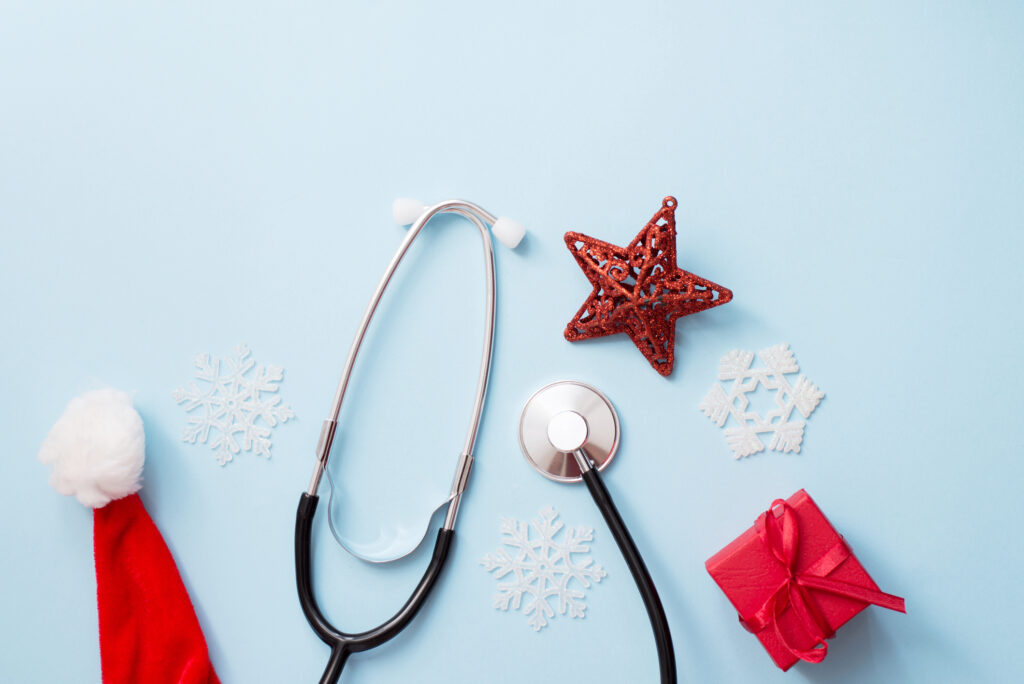It’s no surprise that the holidays are a difficult time for maintaining healthy habits. Alcohol consumption tends to go up, which increases the urge to eat more. Additionally, family gatherings, stress, as well as cases of seasonal affective disorder and depression can all contribute to higher rates of communicable disease. On top of that is the continued influence of the COVID-19 pandemic, the more recent concerns about its Omicron variant, and the push to avoid crowded spaces. If all of this sounds exhausting, we’ve compiled some tips from our telehealth nurses on how to help.
COVID-19
Receiving a COVID-19 vaccine is still the best way to mitigate transmission, as well as avoid severe symptoms, hospitalization, and death. Booster shots are now approved for all adults in the U.S. ages 18 and above, due to waning immunity from the original vaccines. Details on when a booster should be administered, as well as what type, can be found at the CDC.
For those who do not elect to get the vaccine, the CDC continues to recommend wearing masks and social distancing whenever possible, primarily indoors and in areas with limited ventilation. Wash hands more frequently with soap, especially after getting home, and for at least 20 seconds each time. If handwashing is not an option, use hand sanitizer with at least 60 percent alcohol.
It’s also a good practice to consistently clean common touchpoints around the house such as phones, TV remotes, light switches, door and cabinet knobs/handles, pillows, throw blankets, laptops, keyboards, and mice. You can do the same for motor vehicles, primarily with steering consoles, rearview mirrors, touchscreens, and radio dials.
Omicron Variant
The recently identified Omicron variant has become a variant of concern due to its high level of mutations. While its degree of transmissibility and potential resistance to current vaccines are not known, many COVID vaccine makers are already researching ways to tailor their vaccines to target it. For now, the best advice is to continue to follow CDC recommendations and avoid large crowds.
Telehealth Nurse Triage
Patients who need help addressing any concerning medical symptoms can receive guidance from a telehealth triage nurse. Our own nurse triage call center has already experienced heightened anxiety from patients in recent weeks about whether or not their symptoms are indicative of COVID versus the flu, and we only expect this to continue. Our nurses use triage protocols to walk patients through their symptoms and determine the best care they should seek, whether that care should be administered at home, by the patient’s PCP, or at the ER.
Travel
If this year’s Thanksgiving break is any indication, the remainder of the winter holidays could prove to be the busiest season in the last couple of years, says Reuters. People who decide to take public transportation should consult each agency’s requirements when it comes to wearing masks, social distancing, and proof of vaccination, as well as recommendations for how early to arrive and what to do in the event that a booking is delayed, cancelled, or rerouted.
Eating
Sugary treats are in no short supply during the holidays, especially when they’re offered by family, friends, or coworkers. Instead of snacking on these, bring fruit or vegetables from home, as they’re able to do a better job of making you feel full sooner and longer, helping to curb your appetite and avoid additional calories.
Exercise
Cooler temperatures make it tempting to stay indoors and be less mobile. When those hit, consider adding in some short cardio or high-intensity interval training (HIIT). Both are great at alleviating stress and even the symptoms for some medical conditions. If these workouts are too involved, simple five-minute walks outdoors can help get the blood flowing and allow you to absorb a little extra vitamin D. When the outdoors aren’t an option, we’ve even got some easy indoor exercises you can perform in-between time with friends and family (or at the office).
Sleep
Thanks to COVID, there’s a lot more remote-based work and Netflix streaming going on in the world. While that’s good for staying safe, it can easily take a toll on sleep cycles. Minimize blue light exposure from mobile devices by limiting the time you spend on them (including the temptation for late-night TV), and try to set a sleep schedule that allows for seven to nine hours every night. Doing this also helps curb the temptation to eat foods high in fat and sugar.
Alcohol
Americans have a tendency to increase their alcohol consumption around the holidays. It might feel like fun in the moment, but the aftereffects can definitely add up, from disrupted sleep and poor exercise to increased sugars and weight gain. Be mindful of alcohol’s effects, accompany it with food, and consider creative nonalcoholic options that are just as celebratory, suggests NIAAA.
Regardless of where the holidays take you, we hope that yours is both safe and enjoyable, and that these tips are of benefit to you and others looking for ways to stay healthier. That said, if your team also needs help reassuring the health and wellness of your patients, we can do that, too. Let’s schedule some time to talk about our telehealth nurse triage services that can extend the phone-based support of your practice.
About TriageLogic
TriageLogic is a URAC-accredited, physician-led provider of top-quality nurse telehealth technology, remote patient monitoring, and medical call center solutions. Founded in 2007, the TriageLogic Group now serves more than 9,000 physicians and covers over 25 million lives nationwide.





